Business Law Case Study: Contractual Analysis and Legal Issues
VerifiedAdded on 2023/06/11
|7
|1414
|232
Case Study
AI Summary
This assignment presents a comprehensive analysis of several business law case studies, focusing on core principles of contract law, identity theft under the Fair and Accurate Credit Transactions Act (FACT), and the doctrine of equitable estoppels. It examines the validity of oral contracts, the statute of fraud, and the enforceability of lease agreements. The analysis also covers express and implied contract terms, and the importance of evidence in legal claims. Furthermore, the assignment discusses the elements of a legally binding contract, comparing traditional agreement processes with those in e-commerce, highlighting the significance of electronic signatures and clear contract terms. It considers factors that influence a judge or jury's determination of parties' intent, such as the seriousness of the contract, the intention to create legal relations, and the absence of coercion. The assignment concludes by referencing relevant legal documents and cases.

Running head: BUSINESS LAW
Case study
Name of the Student
Name of the University
Author Note
Case study
Name of the Student
Name of the University
Author Note
Paraphrase This Document
Need a fresh take? Get an instant paraphrase of this document with our AI Paraphraser
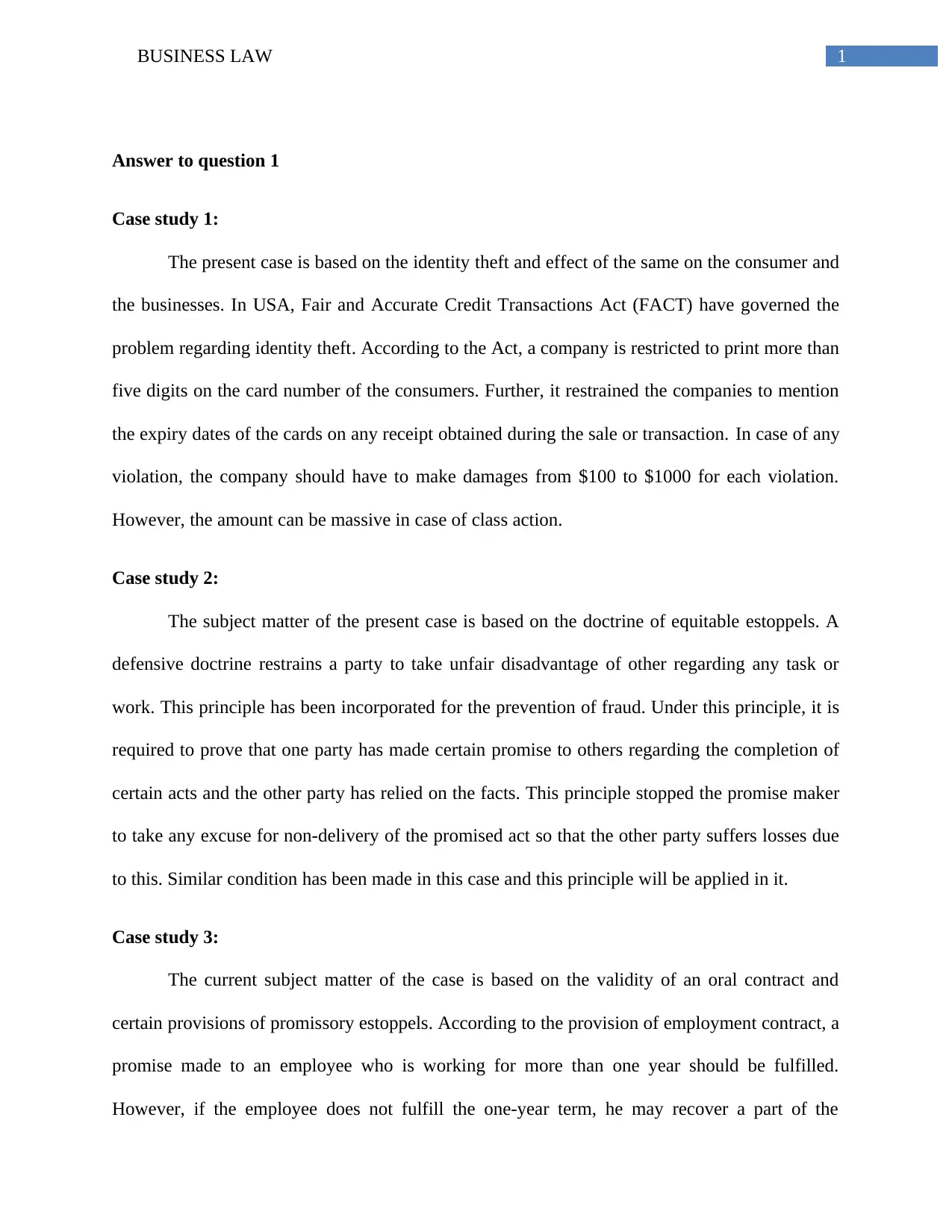
1BUSINESS LAW
Answer to question 1
Case study 1:
The present case is based on the identity theft and effect of the same on the consumer and
the businesses. In USA, Fair and Accurate Credit Transactions Act (FACT) have governed the
problem regarding identity theft. According to the Act, a company is restricted to print more than
five digits on the card number of the consumers. Further, it restrained the companies to mention
the expiry dates of the cards on any receipt obtained during the sale or transaction. In case of any
violation, the company should have to make damages from $100 to $1000 for each violation.
However, the amount can be massive in case of class action.
Case study 2:
The subject matter of the present case is based on the doctrine of equitable estoppels. A
defensive doctrine restrains a party to take unfair disadvantage of other regarding any task or
work. This principle has been incorporated for the prevention of fraud. Under this principle, it is
required to prove that one party has made certain promise to others regarding the completion of
certain acts and the other party has relied on the facts. This principle stopped the promise maker
to take any excuse for non-delivery of the promised act so that the other party suffers losses due
to this. Similar condition has been made in this case and this principle will be applied in it.
Case study 3:
The current subject matter of the case is based on the validity of an oral contract and
certain provisions of promissory estoppels. According to the provision of employment contract, a
promise made to an employee who is working for more than one year should be fulfilled.
However, if the employee does not fulfill the one-year term, he may recover a part of the
Answer to question 1
Case study 1:
The present case is based on the identity theft and effect of the same on the consumer and
the businesses. In USA, Fair and Accurate Credit Transactions Act (FACT) have governed the
problem regarding identity theft. According to the Act, a company is restricted to print more than
five digits on the card number of the consumers. Further, it restrained the companies to mention
the expiry dates of the cards on any receipt obtained during the sale or transaction. In case of any
violation, the company should have to make damages from $100 to $1000 for each violation.
However, the amount can be massive in case of class action.
Case study 2:
The subject matter of the present case is based on the doctrine of equitable estoppels. A
defensive doctrine restrains a party to take unfair disadvantage of other regarding any task or
work. This principle has been incorporated for the prevention of fraud. Under this principle, it is
required to prove that one party has made certain promise to others regarding the completion of
certain acts and the other party has relied on the facts. This principle stopped the promise maker
to take any excuse for non-delivery of the promised act so that the other party suffers losses due
to this. Similar condition has been made in this case and this principle will be applied in it.
Case study 3:
The current subject matter of the case is based on the validity of an oral contract and
certain provisions of promissory estoppels. According to the provision of employment contract, a
promise made to an employee who is working for more than one year should be fulfilled.
However, if the employee does not fulfill the one-year term, he may recover a part of the
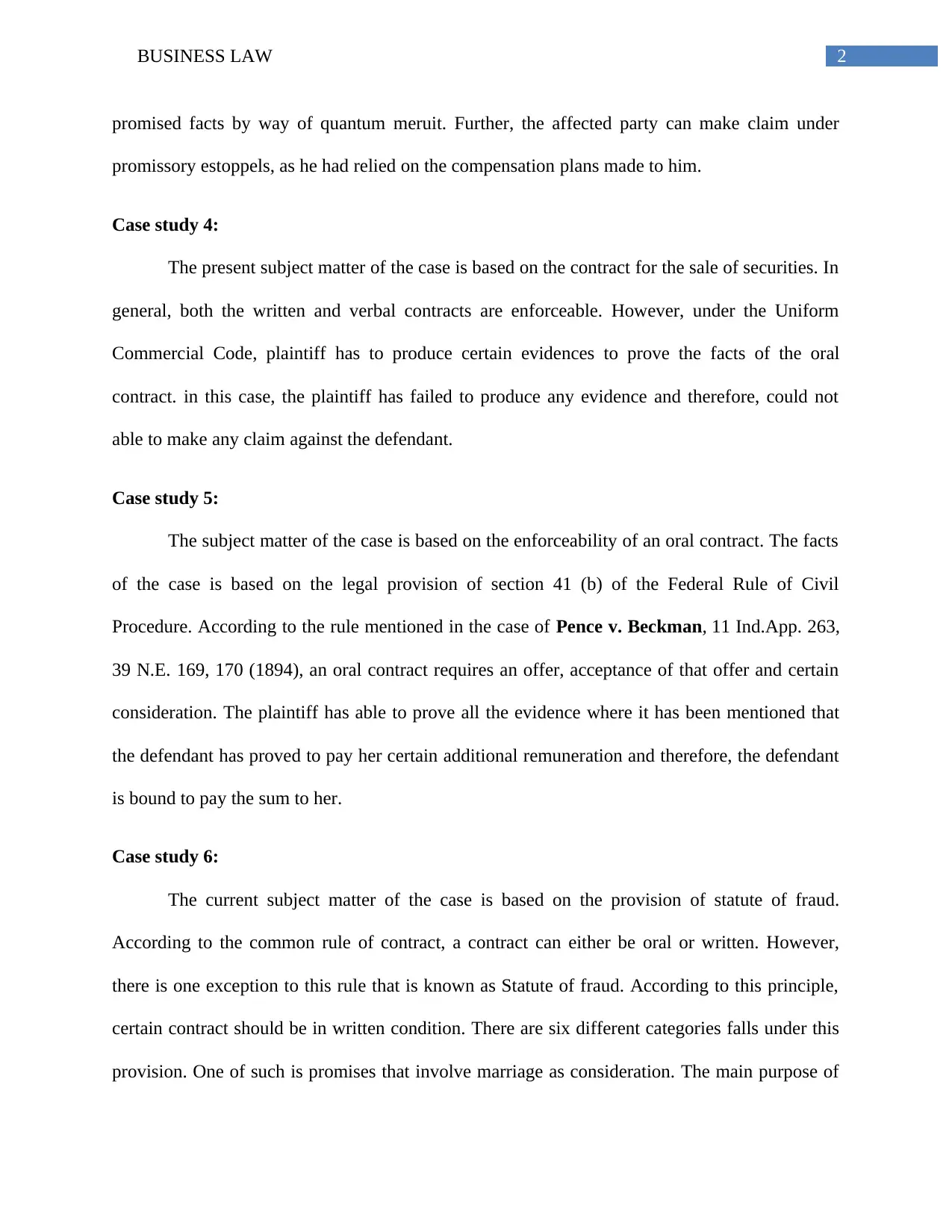
2BUSINESS LAW
promised facts by way of quantum meruit. Further, the affected party can make claim under
promissory estoppels, as he had relied on the compensation plans made to him.
Case study 4:
The present subject matter of the case is based on the contract for the sale of securities. In
general, both the written and verbal contracts are enforceable. However, under the Uniform
Commercial Code, plaintiff has to produce certain evidences to prove the facts of the oral
contract. in this case, the plaintiff has failed to produce any evidence and therefore, could not
able to make any claim against the defendant.
Case study 5:
The subject matter of the case is based on the enforceability of an oral contract. The facts
of the case is based on the legal provision of section 41 (b) of the Federal Rule of Civil
Procedure. According to the rule mentioned in the case of Pence v. Beckman, 11 Ind.App. 263,
39 N.E. 169, 170 (1894), an oral contract requires an offer, acceptance of that offer and certain
consideration. The plaintiff has able to prove all the evidence where it has been mentioned that
the defendant has proved to pay her certain additional remuneration and therefore, the defendant
is bound to pay the sum to her.
Case study 6:
The current subject matter of the case is based on the provision of statute of fraud.
According to the common rule of contract, a contract can either be oral or written. However,
there is one exception to this rule that is known as Statute of fraud. According to this principle,
certain contract should be in written condition. There are six different categories falls under this
provision. One of such is promises that involve marriage as consideration. The main purpose of
promised facts by way of quantum meruit. Further, the affected party can make claim under
promissory estoppels, as he had relied on the compensation plans made to him.
Case study 4:
The present subject matter of the case is based on the contract for the sale of securities. In
general, both the written and verbal contracts are enforceable. However, under the Uniform
Commercial Code, plaintiff has to produce certain evidences to prove the facts of the oral
contract. in this case, the plaintiff has failed to produce any evidence and therefore, could not
able to make any claim against the defendant.
Case study 5:
The subject matter of the case is based on the enforceability of an oral contract. The facts
of the case is based on the legal provision of section 41 (b) of the Federal Rule of Civil
Procedure. According to the rule mentioned in the case of Pence v. Beckman, 11 Ind.App. 263,
39 N.E. 169, 170 (1894), an oral contract requires an offer, acceptance of that offer and certain
consideration. The plaintiff has able to prove all the evidence where it has been mentioned that
the defendant has proved to pay her certain additional remuneration and therefore, the defendant
is bound to pay the sum to her.
Case study 6:
The current subject matter of the case is based on the provision of statute of fraud.
According to the common rule of contract, a contract can either be oral or written. However,
there is one exception to this rule that is known as Statute of fraud. According to this principle,
certain contract should be in written condition. There are six different categories falls under this
provision. One of such is promises that involve marriage as consideration. The main purpose of
⊘ This is a preview!⊘
Do you want full access?
Subscribe today to unlock all pages.

Trusted by 1+ million students worldwide
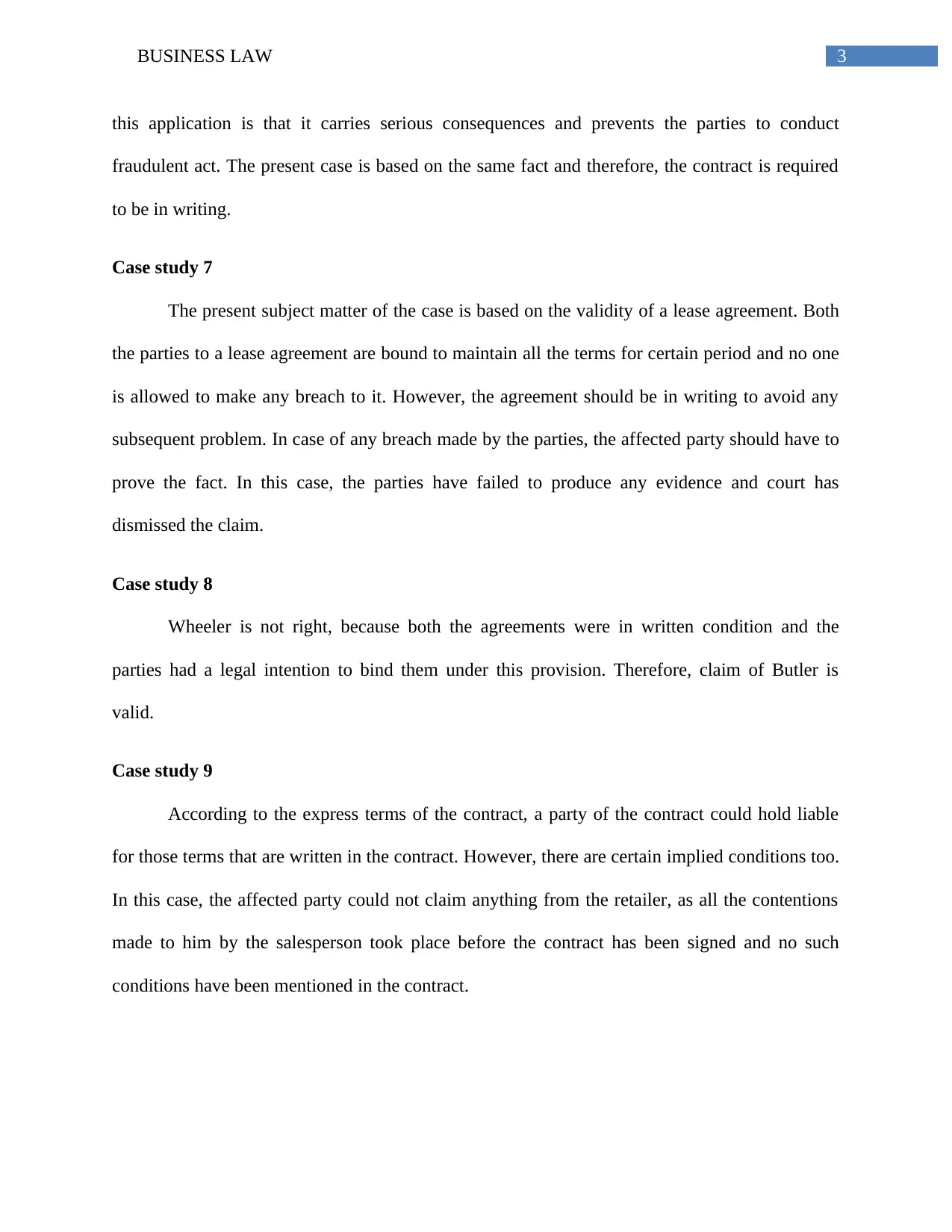
3BUSINESS LAW
this application is that it carries serious consequences and prevents the parties to conduct
fraudulent act. The present case is based on the same fact and therefore, the contract is required
to be in writing.
Case study 7
The present subject matter of the case is based on the validity of a lease agreement. Both
the parties to a lease agreement are bound to maintain all the terms for certain period and no one
is allowed to make any breach to it. However, the agreement should be in writing to avoid any
subsequent problem. In case of any breach made by the parties, the affected party should have to
prove the fact. In this case, the parties have failed to produce any evidence and court has
dismissed the claim.
Case study 8
Wheeler is not right, because both the agreements were in written condition and the
parties had a legal intention to bind them under this provision. Therefore, claim of Butler is
valid.
Case study 9
According to the express terms of the contract, a party of the contract could hold liable
for those terms that are written in the contract. However, there are certain implied conditions too.
In this case, the affected party could not claim anything from the retailer, as all the contentions
made to him by the salesperson took place before the contract has been signed and no such
conditions have been mentioned in the contract.
this application is that it carries serious consequences and prevents the parties to conduct
fraudulent act. The present case is based on the same fact and therefore, the contract is required
to be in writing.
Case study 7
The present subject matter of the case is based on the validity of a lease agreement. Both
the parties to a lease agreement are bound to maintain all the terms for certain period and no one
is allowed to make any breach to it. However, the agreement should be in writing to avoid any
subsequent problem. In case of any breach made by the parties, the affected party should have to
prove the fact. In this case, the parties have failed to produce any evidence and court has
dismissed the claim.
Case study 8
Wheeler is not right, because both the agreements were in written condition and the
parties had a legal intention to bind them under this provision. Therefore, claim of Butler is
valid.
Case study 9
According to the express terms of the contract, a party of the contract could hold liable
for those terms that are written in the contract. However, there are certain implied conditions too.
In this case, the affected party could not claim anything from the retailer, as all the contentions
made to him by the salesperson took place before the contract has been signed and no such
conditions have been mentioned in the contract.
Paraphrase This Document
Need a fresh take? Get an instant paraphrase of this document with our AI Paraphraser
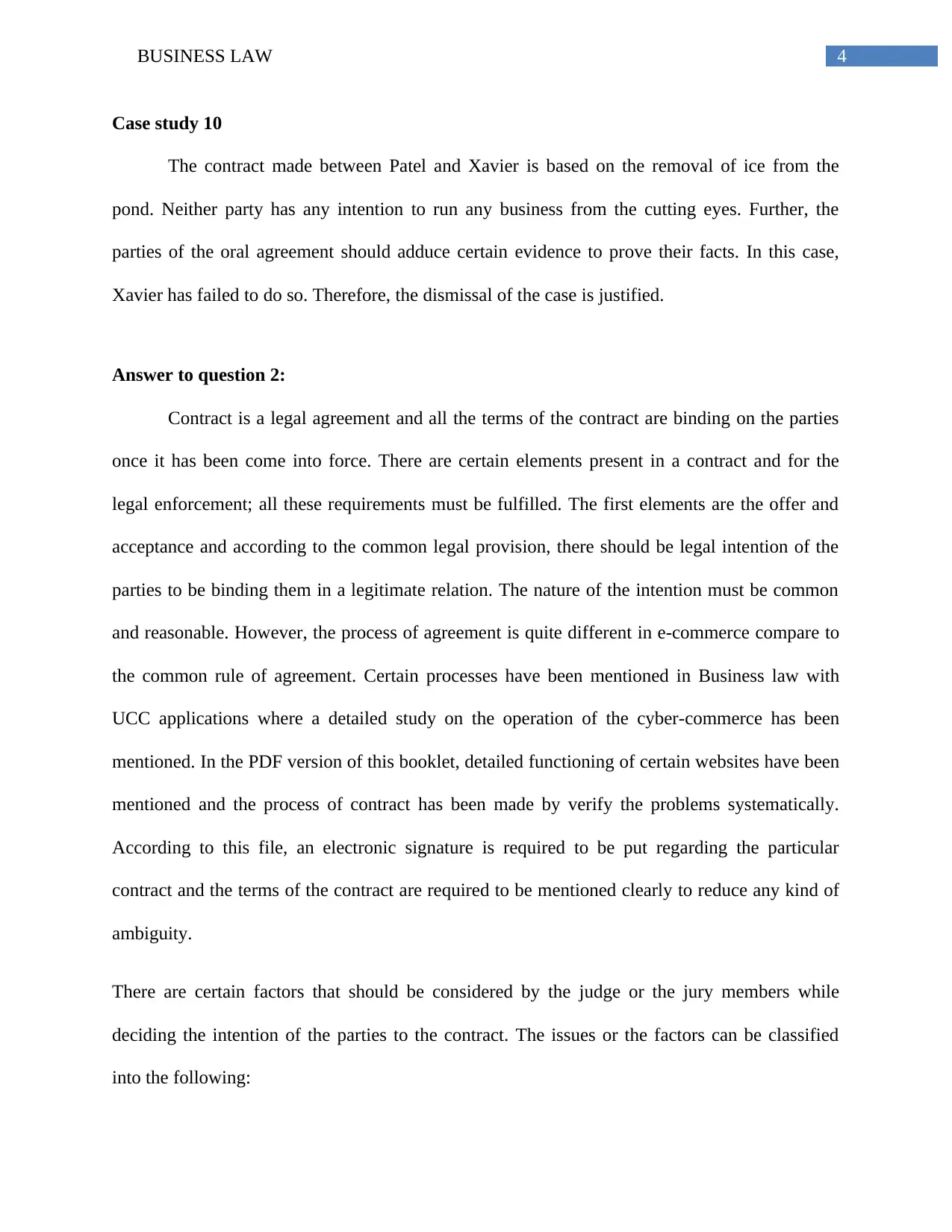
4BUSINESS LAW
Case study 10
The contract made between Patel and Xavier is based on the removal of ice from the
pond. Neither party has any intention to run any business from the cutting eyes. Further, the
parties of the oral agreement should adduce certain evidence to prove their facts. In this case,
Xavier has failed to do so. Therefore, the dismissal of the case is justified.
Answer to question 2:
Contract is a legal agreement and all the terms of the contract are binding on the parties
once it has been come into force. There are certain elements present in a contract and for the
legal enforcement; all these requirements must be fulfilled. The first elements are the offer and
acceptance and according to the common legal provision, there should be legal intention of the
parties to be binding them in a legitimate relation. The nature of the intention must be common
and reasonable. However, the process of agreement is quite different in e-commerce compare to
the common rule of agreement. Certain processes have been mentioned in Business law with
UCC applications where a detailed study on the operation of the cyber-commerce has been
mentioned. In the PDF version of this booklet, detailed functioning of certain websites have been
mentioned and the process of contract has been made by verify the problems systematically.
According to this file, an electronic signature is required to be put regarding the particular
contract and the terms of the contract are required to be mentioned clearly to reduce any kind of
ambiguity.
There are certain factors that should be considered by the judge or the jury members while
deciding the intention of the parties to the contract. The issues or the factors can be classified
into the following:
Case study 10
The contract made between Patel and Xavier is based on the removal of ice from the
pond. Neither party has any intention to run any business from the cutting eyes. Further, the
parties of the oral agreement should adduce certain evidence to prove their facts. In this case,
Xavier has failed to do so. Therefore, the dismissal of the case is justified.
Answer to question 2:
Contract is a legal agreement and all the terms of the contract are binding on the parties
once it has been come into force. There are certain elements present in a contract and for the
legal enforcement; all these requirements must be fulfilled. The first elements are the offer and
acceptance and according to the common legal provision, there should be legal intention of the
parties to be binding them in a legitimate relation. The nature of the intention must be common
and reasonable. However, the process of agreement is quite different in e-commerce compare to
the common rule of agreement. Certain processes have been mentioned in Business law with
UCC applications where a detailed study on the operation of the cyber-commerce has been
mentioned. In the PDF version of this booklet, detailed functioning of certain websites have been
mentioned and the process of contract has been made by verify the problems systematically.
According to this file, an electronic signature is required to be put regarding the particular
contract and the terms of the contract are required to be mentioned clearly to reduce any kind of
ambiguity.
There are certain factors that should be considered by the judge or the jury members while
deciding the intention of the parties to the contract. The issues or the factors can be classified
into the following:

5BUSINESS LAW
Whether the minds of the parties are to enter into a serious contract or not;
Whether all the parties have common intention to create legal relations or not;
Whether any of the parties has taken any coercive methods to obtain the consent;
Whether the contract has any binding effect or not
Whether the minds of the parties are to enter into a serious contract or not;
Whether all the parties have common intention to create legal relations or not;
Whether any of the parties has taken any coercive methods to obtain the consent;
Whether the contract has any binding effect or not
⊘ This is a preview!⊘
Do you want full access?
Subscribe today to unlock all pages.

Trusted by 1+ million students worldwide
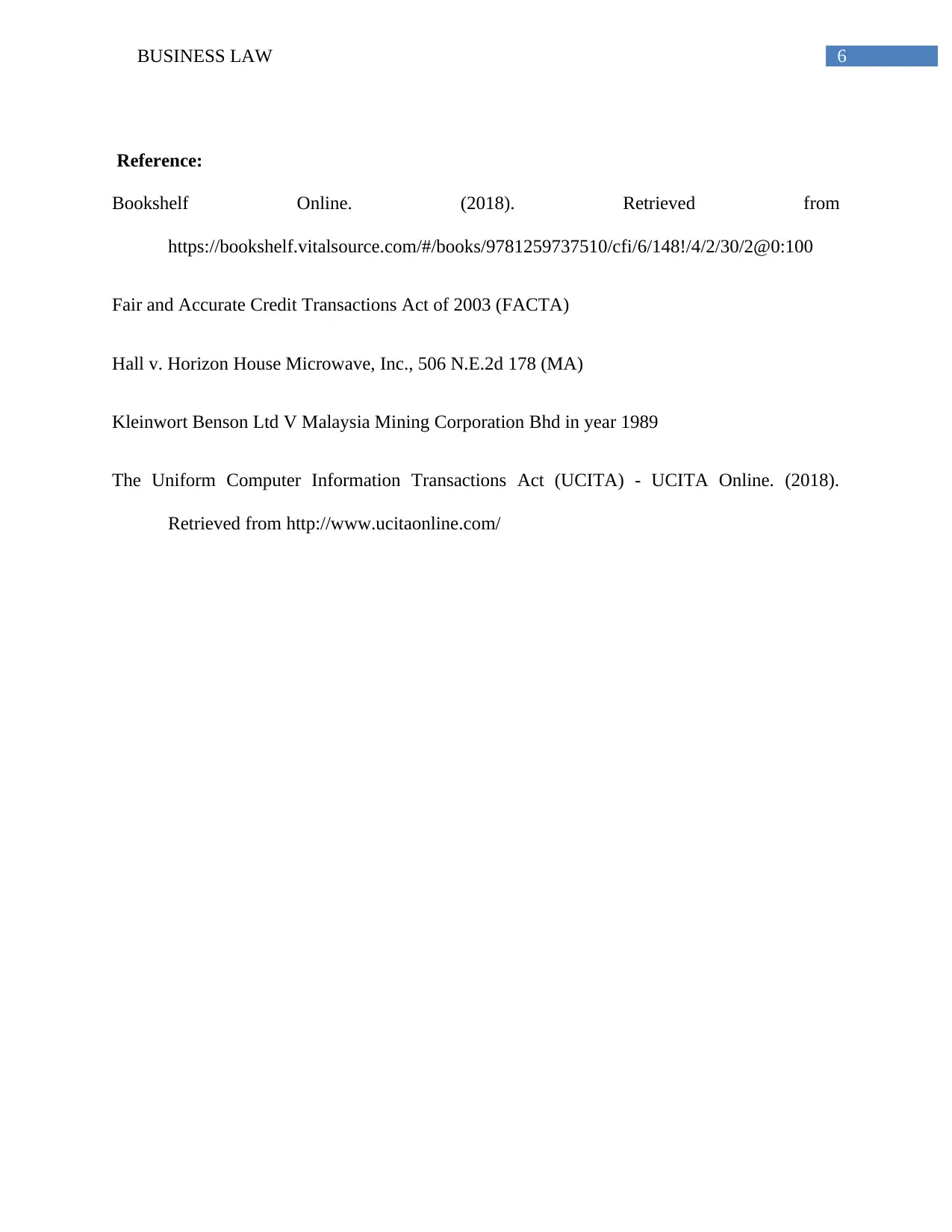
6BUSINESS LAW
Reference:
Bookshelf Online. (2018). Retrieved from
https://bookshelf.vitalsource.com/#/books/9781259737510/cfi/6/148!/4/2/30/2@0:100
Fair and Accurate Credit Transactions Act of 2003 (FACTA)
Hall v. Horizon House Microwave, Inc., 506 N.E.2d 178 (MA)
Kleinwort Benson Ltd V Malaysia Mining Corporation Bhd in year 1989
The Uniform Computer Information Transactions Act (UCITA) - UCITA Online. (2018).
Retrieved from http://www.ucitaonline.com/
Reference:
Bookshelf Online. (2018). Retrieved from
https://bookshelf.vitalsource.com/#/books/9781259737510/cfi/6/148!/4/2/30/2@0:100
Fair and Accurate Credit Transactions Act of 2003 (FACTA)
Hall v. Horizon House Microwave, Inc., 506 N.E.2d 178 (MA)
Kleinwort Benson Ltd V Malaysia Mining Corporation Bhd in year 1989
The Uniform Computer Information Transactions Act (UCITA) - UCITA Online. (2018).
Retrieved from http://www.ucitaonline.com/
1 out of 7
Related Documents
Your All-in-One AI-Powered Toolkit for Academic Success.
+13062052269
info@desklib.com
Available 24*7 on WhatsApp / Email
![[object Object]](/_next/static/media/star-bottom.7253800d.svg)
Unlock your academic potential
Copyright © 2020–2025 A2Z Services. All Rights Reserved. Developed and managed by ZUCOL.





